Related Research Articles

Harlan Jay Ellison was an American writer, known for his prolific and influential work in New Wave speculative fiction and for his outspoken, combative personality. His published works include more than 1,700 short stories, novellas, screenplays, comic book scripts, teleplays, essays, and a wide range of criticism covering literature, film, television, and print media. Some of his best-known works include the 1967 Star Trek episode "The City on the Edge of Forever", considered by some to be the single greatest episode of the Star Trek franchise, his A Boy and His Dog cycle, and his short stories "I Have No Mouth, and I Must Scream" and "'Repent, Harlequin!' Said the Ticktockman". He was also editor and anthologist for Dangerous Visions (1967) and Again, Dangerous Visions (1972). Ellison won numerous awards, including multiple Hugos, Nebulas, and Edgars.
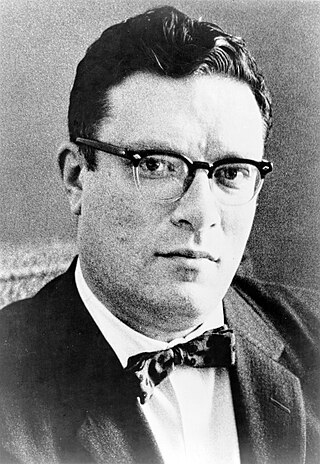
Isaac Asimov was an American writer and professor of biochemistry at Boston University. During his lifetime, Asimov was considered one of the "Big Three" science fiction writers, along with Robert A. Heinlein and Arthur C. Clarke. A prolific writer, he wrote or edited more than 500 books. He also wrote an estimated 90,000 letters and postcards. Best known for his hard science fiction, Asimov also wrote mysteries and fantasy, as well as popular science and other non-fiction.
"Second Variety" is a science fiction novelette by American writer Philip K. Dick, first published in Space Science Fiction magazine, in May 1953. Set in a world where war between the Soviet Union and United Nations has reduced most of the world to a barren wasteland, the story concerns the discovery, by the few remaining soldiers left, that self-replicating robots originally built to assassinate Soviet agents have gained sentience and are now plotting against both sides. It is one of many stories by Dick examining the implications of nuclear war, particularly after it has destroyed much or all of the planet.
"Faith of Our Fathers" is a science fiction short story by American writer Philip K. Dick, first published in the anthology Dangerous Visions (1967).

A Boy and His Dog is a cycle of narratives by author Harlan Ellison. The cycle tells the story of an amoral boy (Vic) and his telepathic dog (Blood), who work together as a team to survive in the post-apocalyptic world after a nuclear war. The original 1969 novella was adapted into the 1975 film A Boy and His Dog directed by L.Q. Jones. Both the story and the film were well-received by critics and science fiction fans, but the film was not successful commercially. The original novella was followed by short stories and a graphic novel. The dog in the movie was first in the 1969 Brady Bunch episodes named Tiger.
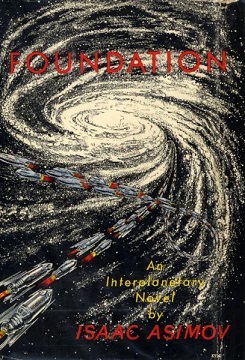
Foundation is a science fiction novel by American writer Isaac Asimov. It is the first book in the Foundation Trilogy. Foundation is a cycle of five interrelated short stories, first published as a single book by Gnome Press in 1951. Collectively they tell the early story of the Foundation, an institute founded by psychohistorian Hari Seldon to preserve the best of galactic civilization after the collapse of the Galactic Empire.
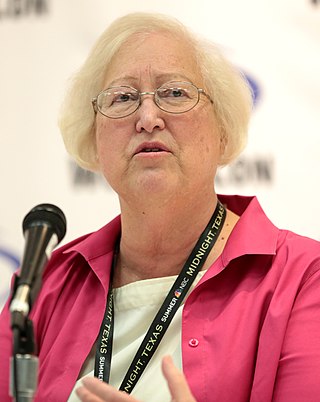
Constance Elaine Trimmer Willis, commonly known as Connie Willis, is an American science fiction and fantasy writer. She has won eleven Hugo Awards and seven Nebula Awards for particular works—more major SF awards than any other writer—most recently the "Best Novel" Hugo and Nebula Awards for Blackout/All Clear (2010). She was inducted by the Science Fiction Hall of Fame in 2009 and the Science Fiction Writers of America named her its 28th SFWA Grand Master in 2011.

David Rowland Langford is a British author, editor, and critic, largely active within the science fiction field. He publishes the science-fiction fanzine and newsletter Ansible and holds the all-time record for most Hugo Awards, with a total of 29 wins.

"I Have No Mouth, and I Must Scream" is a post-apocalyptic science fiction short story by American writer Harlan Ellison. It was first published in the March 1967 issue of IF: Worlds of Science Fiction.
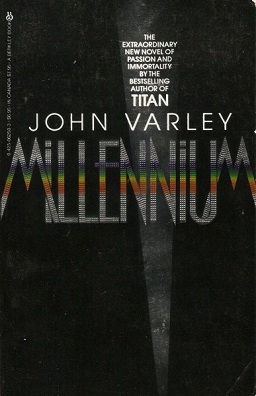
Millennium is a 1983 science fiction novel by John Varley. Varley later turned this novel into the script for the 1989 film Millennium, both of which are based on Varley's short story "Air Raid", which was published in 1977.

Lucifer's Hammer is a science fiction post-apocalypse-survival novel by American writers Larry Niven and Jerry Pournelle that was first published in 1977. It was nominated for the Hugo Award for Best Novel in 1978. Two issues of a planned six-part comic book adaptation were published by Innovation Comics in 1993.
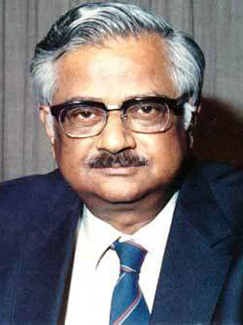
Raja Ramanna was an Indian physicist. He was the director of India's nuclear program in the late 1960s and early 1970s, which culminated in Smiling Buddha, India's first successful nuclear weapon test on 18 May 1974.
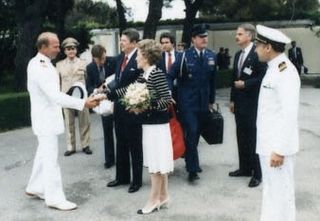
The nuclear football is a briefcase, the contents of which are to be used by the president of the United States to communicate and authorize a nuclear attack while away from fixed command centers, such as the White House Situation Room or the Presidential Emergency Operations Center. Functioning as a mobile hub in the strategic defense system of the United States, the football is carried by a military aide when the president is traveling.

John Michael Scalzi II is an American science fiction author and former president of the Science Fiction and Fantasy Writers of America. He is best known for his Old Man's War series, three novels of which have been nominated for the Hugo Award, and for his blog Whatever, where he has written on a number of topics since 1998. He won the Hugo Award for Best Fan Writer in 2008 based predominantly on that blog, which he has also used for several charity drives. His novel Redshirts won the 2013 Hugo Award for Best Novel. He has written non-fiction books and columns on diverse topics such as finance, video games, films, astronomy, writing and politics, and served as a creative consultant for the TV series Stargate Universe.
The Laundry Files is a series of novels by British writer Charles Stross. They mix the genres of Lovecraftian horror, spy thriller, science fiction, and workplace humour. Their main character for the first five novels is "Bob Howard", a one-time I.T. consultant turned occult field agent. Howard is recruited to work for the Q-Division of SOE, otherwise known as "the Laundry", the British government agency which deals with occult threats. "Magic" is described as being a branch of applied computation (mathematics), therefore computers and equations are just as useful, and perhaps more potent, than classic spellbooks, pentagrams, and sigils for the purpose of influencing ancient powers and opening gates to other dimensions. These occult struggles happen largely out of view of the public, as the Laundry seeks to keep the methods for contacting such powers under wraps. There are also elements of dry humour and satirisation of bureaucracy.

A nuclear briefcase is a specially outfitted briefcase used to authorize the use of nuclear weapons and is usually kept near the leader of a nuclear weapons state at all times.
"The Lady Astronaut of Mars" is an alternate history/science fiction short story by Mary Robinette Kowal. It was first published in 2012 as part of the Audible.com anthology Rip-Off.
"I Sexually Identify as an Attack Helicopter" is a military science fiction short story by Isabel Fall, published on 1 January 2020 in Clarkesworld Magazine. The story relates the experience of Barb, a woman whose gender has been reassigned to "attack helicopter" so as to make her a better pilot. It was a finalist for the 2021 Hugo Award, under the title "Helicopter Story".
"Of Mist, and Grass, and Sand" is a science fiction short story by American writer Vonda N. McIntyre. First published in Analog Science Fiction and Fact in October 1973, it was anthologized multiple times, and also formed the first chapter of McIntyre's 1978 novel Dreamsnake. Set after a nuclear holocaust, "Of Mist, and Grass, and Sand" tells of Snake, a healer who uses the venom of three genetically engineered snakes to heal, and follows her effort to heal a nomad boy of a tumor. The story won the Nebula Award for Best Novelette in 1974. It was also nominated for the Hugo Award in the same category, and for the Locus Award for Best Short Fiction. Scholar Anne Hudson Jones called it a powerful story, and stated that its themes were "mythic and universal".
Shi Lian Huang, better known as S. L. Huang, is a Hugo-winning science fiction author, as well as the first woman to be a professional armorer in Hollywood.
References
- ↑ 2020 Hugo Awards, at TheHugoAwards.org; retrieved March 6, 2024